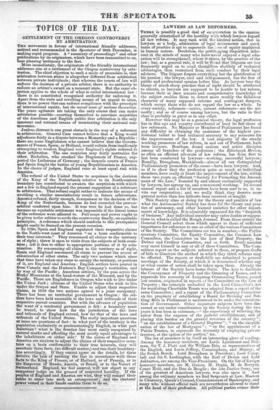TOPICS OF THE DAY.
SETTLEMENT OF THE OREGON CONTROVERSY BY ARBITRATION.
THE movement in favour of international friendly addresses, noticed and recommended in the Spectator of 20th December, is making rapid progress. A " summary of proceedings" and other publications by its originators, which have been transmitted to us, bear pleasing testimony to the fact.
More immediately, the originators of the friendly international addresses aim at a settlement of the Oregon controversy by arbi- tration. The chief objection to such a mode of procedure is, that arbitration between states is altogether different from arbitration between private individuals ; that whereas the courts of law will enforce the decision of a private arbiter, there is no authority to enforce an arbiter's award on a recusant state. But the same ob- jection applies to the whole of what is called international law : there is no constituted recognized authority for enforcing it. Apart from the rude and revolting means of an appeal to arms, there is no power that can enforce compliance with the prescripts of international equity, but the moral sense of nations themselves. The peace agitators are taking the only course that can make arbitration possible—exerting themselves to convince majorities of the American and English public that arbitration is the only innocent and rational means of terminating their national con- troversies.
Jealous distrust is one great obstacle in the way of a reference to arbitration. General Cass cannot believe that a King would adjudicate fairly in a dispute between a Monarchy and a Republic : there are some Englishmen who cannot believe that the Govern- ments of France, Spain, or Holland, would refrain from insidiously attempting to weaken England were England's rights referred to their arbitration. The one suspicion may fairly neutralize the other. Richelieu, who crushed the Huguenots of France, sup- ported the Lutherans of Germany ; the despotic courts of France and Spain fought the battles of young Republicanism in America. In the choice of judges, England runs at least equal risk with America. • The refusal of the United States to acquiesce in the decision of the King of the Netherlands relative to its North-eastern boundary has contributed to awaken the scepticism with which not a few in England regard the present suggestion of a reference to arbitration. That refusal ought rather to indicate the means of avoiding a similar unsatisfactory result in future arbitrations. America refused, fairly enough, to acquiesce in the decision of the King of the Netherlands, because he had exceeded the powers- arbitral conferred upon him. It was true he had done so, but because an equitable settlement was impossible if the literal terms of the reference were adhered to. Full scope and power ought to be given to the arbiter to settle the controversy finally, on equitable principles. A reference which should conform to this prerequisite might easily be framed on the present occasion. In 1790, Spain and England regulated their respective claims to the North-west coast of America " on a basis conformable to their true interests." They renounced all claims to the territory as of right; threw it open to visits from the subjects of both coun- tries ; left it free to either to appropriate portions of it by colo- nization. By renouncing all claims to the territory as of right, Spain and England renounced all claim to prevent the access or colonization of other states. The only two nations which since that time have taken any steps to occupy the territory, or portions of it, are England and America : English settlers have poured in from Canada and the Hudson's Bay Company's territories, and by way of the Pacific ; American settlers, by the pass across the Rocky Mountains at the head-waters of the Missouri, and by the Pacific. There are Englishmen in Oregon who wish to live under the Union Jack ; citizens of the United States who wish to live under the Stripes and Stars. Unable to adjust their respective claims, in 1818 the two nations agreed to a joint occupancy. There has been no territorial government in Oregon : the set- tlers have been held amenable to the laws and tribunals of their respective parent countries. But with the advance of population the want of a territorial government is felt: a boundary must be traced, to show how far the jurisdiction of the laws and tribunals of England extend, how far that of the laws and tribunals of the United States. The really important questions at issue are questions of fact : in what part of the territory is the population exclusively or predominatingly English, in what part -American '? what is the frontier line most easily recognized by natural marks and affording the most nearly equal advantages to the inhabitants on either side? If the rulers of England and America are anxious to adjust the claims of their respective coun- tries on a basis conformable to their true interests, they will ascertain these facts, (no difficult matter,) and run their boundary- line accordingly. If they cannot agree on the details, let them devolve the task of running the line in accordance with these facts to the King of France, or of Holland, or of Prussia, or to the Emperors of Russia, Austria, or Brazil, or to the Vorort of Switzerland. England, we feel assured, will not object to any competent judge on the ground of suspected hostility. If the peoples of England and America are wise, they will compel their rulers to enter into such an arrangement; and the electoral power vested in their hands enables them to do so.


























 Previous page
Previous page